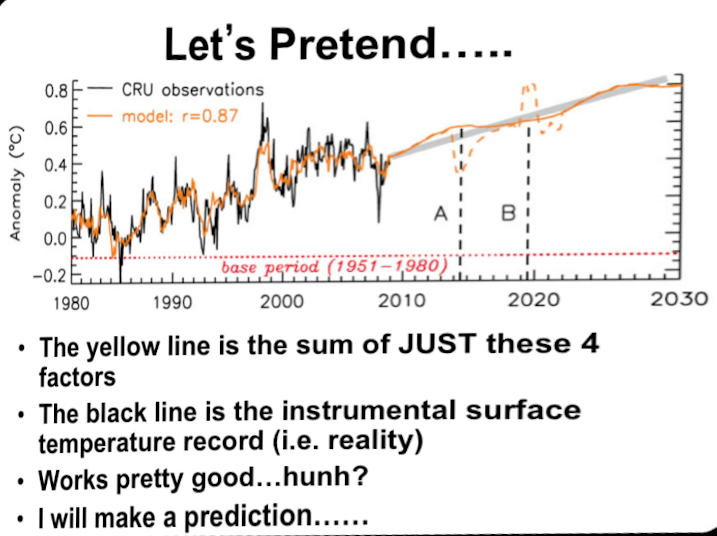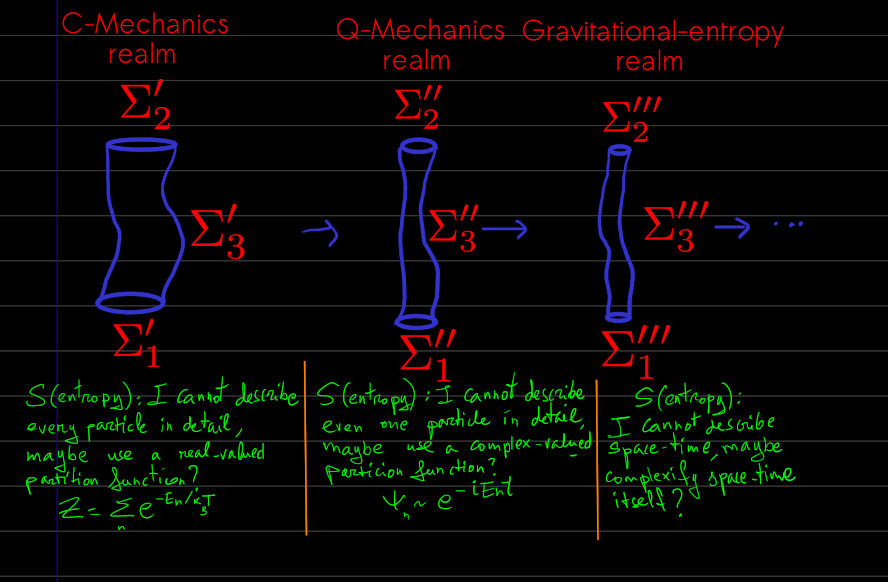
Everything posted by joigus
-
We keep discovering life on Earth
But Danijel, aren't all definitions limiting? By definition?
-
Climate modeling and decision milestones
Ok. Yes, I left out the Milankovitch cycles precisely because of that. Dan Britt does mention them in his talk at some point, but does not include them in the couple of graphs that I pasted there for reasons I guessed exactly as you said. I do remember that he mentions we are something like 100 years within one of them (glaciation), and yet glaciers are melting. That should be significant too, I surmise.
-
Climate modeling and decision milestones
Another thing to regret: Mathematics are frequently used to dress up crackpot ideas, and other times to dismiss arguments, no matter how qualitatively and clearly they are presented. The very question concerning lagging vs leading which has surfaced before I find very interesting, but it's a question that has to be formulated with a bare-minimum mathematics after all.
-
We keep discovering life on Earth
You're right. Thank you for reminding us. The truth is these sponges could be enormously interesting in regards to appearance of life. Sponges are very primitive. They were there before the Cambrian explosion and Ediacara... And guess what, just before the Ediacara there was Snow Ball Earth. All life was presumably under the ice. Now these sponges are Arctic... Coincidence?
-
We keep discovering life on Earth
If this thing can make ribosomes that can make ribosomes, I guess it does. Because it derived from something that could make ribosomes that could make ribosomes.
-
Climate modeling and decision milestones
Very constructive thoughts there. I think the equivalent black body would be taken into account by correcting for the albedo, as Swansont suggested. I regret that the arguments based on periodicity against a clearly growing term were either not understood, or perhaps not relevant, but to me they are very clear.
- If You Take my Meaning
-
We keep discovering life on Earth
Sea bottoms are not that boring after all... I'll try: Anything that derives from a ribosome and can make ribosomes itself. You can't make a ribosome? You're dead to me.
-
Climate modeling and decision milestones
Of course the average of an average is just the original average, so you're right, error bars don't enter into it. I didn't say they do, though. Error bars are only used to build the confidence interval, which is not what we're talking about here, but correlation. That's why I was careful to distinguish both: It would have been clearer had I said, "Correlation, on the other hand, is just..." I thought I'd been clear, and I apologise for my obscurity. I should have avoided mentioning them at that point altogether. Correlation Correlation is a measure of how much one variable affects the other even when you average over all the other variables that may enter the problem, including x, y (the ones you mean to measure the correlation of). If correlation varies wildly by varying z (meaning all other variables in the problem), then there is no correlation between x, and y at all, because contributions from variations of different z's would tend to cancel out. So you'd be back to <xy>-<x><y>=0 even though for some particular values of z they would display correlation. Periodicity But the thing you're missing here from a mathematical POV, I think, is periodicity --or lack of it. Periodicity gives you a much more robust inkling, IMO, that something's going on here between anthropogenic CO2 and temperature markers. In the time-scale of volcanic events, astrophysical variation, and ocean temperature oscillations, there are several intrinsic periodicities whose overlap shows very clearly in the graph, while the biological factor builds up across time-scales that was the order of tens of millions of years before humans appeared, and in the case of the surging of human intelligence (Anthropocene), in the scale of tens of thousands of years. You can detect periodicities even through non-linear relations*. Consider the simple harmonic function \( f\left( t \right) = F \sin 2t \). You can build an arbitrary function of variable \( f \) and it will still be periodic of the same period even if it's non-linear. For example: \( F\left( t \right) = \exp\left( f\left( t \right) \right) = \exp{F\sin2t} \) is still periodic of same period. Stefan-Boltzmann As to the Stefan-Boltzmann law, Swansont and Studiot have given you a very good account. I just wanted to add about something that's sometimes confusing: What does the Earth have to do with a black body? Indeed, the Earth is not a black body, but you can rest assured that the part of the radiation spectrum from any physical body that contains thermal information about that body (that is, excludes reflected light, or light that goes through it) nicely fits that of a black body. A black body does not reflect any light, that way you get to the part of radiation from anything made of atoms that's only due to radiation having been in thermal equilibrium (or bouncing around long enough inside the body) and then started to re-radiate those photons. Most of the light you receive from a rock that's sitting on your desk is reflected light. Certainly the one in the visible frequencies is (at room temperature). But if you were sensitive enough to see the infrared, you would see a frequency-dependent graph that agrees with the black-body spectrum. *You can even get an idea of the periodicity of solutions of completely unsolvable, untractable systems of differential equations that model a complicated non-linear system by using the periodicity of the coefficients. So yes, mathematically speaking, periodicity is extremely robust when trying to ascertain dependence of behaviours.
-
Climate modeling and decision milestones
Erm... I'm assuming you know correlation doesn't depend on the number of variables involved in the linear regression. Not even on the number of measurements. The number of measurements is used to build the confidence interval --those error bars that Swansont was talking about. Correlation is just the mean <xy>-<x><y> for two variables x and y, so it can be interpreted to represent a measure of how much measurements of two variables cluster around a line. Once we agree on what correlation is, maybe it would be time to go to "hard" references. Or maybe you will teach me new aspects of it I didn't know. Either way, I find the discussion interesting. This constant appeal to "hard" references, TBH, doesn't impress me. I can give you plenty of references --in my specialty, which is not climate science, I admit-- for articles that were peer-reviewed and abysmally wrong, if you're interested. Others that were rejected and dead right. Of course the wrong ones have been kindly forgotten, and the right ones --sometimes published in so-called obscure journals--, elevated to the standard of "seminal papers." It's when scientific results permeate to the scientific communities, and different cross checks are conducted, that we can start talking about scientific consensus, and a well-established scientific idea.
-
Asbestos
It's II-oxidation number for ferrous iron, isn't it?
-
Rep points
I don't find them very useful. The last time I used them, I regretted it. I thought about reverting it. Then I saw another member already had. I don't think I'll used them much, except on account of uncivil behaviour.
-
Climate modeling and decision milestones
I think most of your negative clicks were due to your comment: I didn't give you any negative points. I, for one, welcome scepticism. But scepticism, unfortunately, has to be set against a background of different levels of urgency, as well as the position that these claims have in a context of pre-existing scientific explanations, call it widespread consensus. I will not entertain the question of possible hidden agendas or motivations in this consensus. Seems to me that the conclusions are uncomfortable enough for everybody that we it's very difficult to imagine any credible agenda from the so-called "alarmists." First: The question of global warming is of the utmost urgency. What's a stake is too important to be dispatched with a vague... Hmmm, I have serious doubts about these claims. Second: There is a context of general agreement between climate scientists that the anthropogenic fingerprint, at the very least, must play a role in global warming. There are paleoclimate signatures of this that @TheVat, I think, has mentioned. The best thing about those little bubbles of air trapped in Antarctic ice is that they provide a next-to-exact sample of what the air was like in different times of history. But: The bulk of the argument is not about models and simulations, it's about measurements and correlations. And those have been done with excruciating detail, as told above. I think it's important to say that there are aspects about climate change that are pretty much model-independent or too complicated to be explained with one particular models with say, 4 parameters. So it's not so much a matter of explaining such and such sequence of years, or even decades, of particularly hot winters or particularly cold summers, as it is to explain the completely --and glaringly obviously I should say-- smooth and consistent rise in global temperatures that goes hand in hand with the increase in greenhouse gases in the atmosphere due to human activity. There is such a thing as a big picture. Tim Palmer explains this point that you're --rightfully so-- curious about very clearly during a Pi-Institute talk: https://youtu.be/w-IHJbzRVVU?t=685 (pointing you to the moment when he addresses your question.) Here's a question --directed to @Doogles31731 that was repeated once, and I think is of great importance: If it was answered, I missed it. CO2 absorbs radiation at the typical bandwidth of solar frequencies enough to deserve qualification as a greenhouse gas. You can prove this in a bucket if you want, and then reasonably assume it's not going to change for the atmosphere, because that's just a property of that particular chemical. Of course, what makes matters considerably more involved is that the atmosphere is a much more complicated system and there are many other factors at play, because there are lots of noise effects that muddle things up: continental drift, weathering, ocean circulation patterns, astronomical cycles, to name just a few. Here's a couple of graphs from another talk given by Dan Britt, under the heading, "let's pretend that short-term climate is driven by..." that addresses the question of why the peaks and valleys are there, while the increasing slope really seems to be telling us something about longer-term trends: The last graph only takes into account what are believed to be the 4 main factors of climate patterns. The thick grey line is the human activity line. The correlation factor r=.87 says all you need to know. It is conceivable that the overall tendency is not a clean linear superposition of the factors --I wouldn't expect it to be exactly that but as a first approximation--. Nevertheless, neither solar-spot cycles, nor volcanic aerosol levels, nor ENSO cycles display that very clear ascending slope that human activity does. It's anthropogenic emissions that give it that character. It must be something emerging from biology. It doesn't fit any stellar cycle that I know of, nor tectonic, nor having to do with ocean regimes. What else could it be? I will resist the temptation to quote Sherlock Holmes once more.
-
Members' participation
This is most unfair. I work hard on my posts, while @dimreepr, to take just one example, gets by with the likes of, Don't we all? Does it matter? Imagine that! Now serious, the computer has taken over my life too. Similar to @Peterkin, I have a browser tab with the forums open and take a look from time to time, when I get a break.
-
Does a Static EM Field Acquire Mass Due to Stored Energy?
If we're talking QFT, yes. I think we're talking classical here though. If we're talking QFT, even massive-particle momentum has to be generalised, and off-shell it can take all values when you don't look at them. The moment you want to measure the actual momentum of a virtual particle, you bring it back on shell.
-
Does a Static EM Field Acquire Mass Due to Stored Energy?
Forgot to mention that the definition that both @Genady and I mentioned is not valid for a massless particle. For such massless particle the definition must be changed to, \[p^{\mu}=\left(\frac{E}{c},\boldsymbol{k}\right)\] with the "length" of \(\boldsymbol{k}\) being, \[\left\Vert \boldsymbol{k}\right\Vert =E/c\]
-
Does a Static EM Field Acquire Mass Due to Stored Energy?
It was changed in time immemorial --to me at least--. It is: \[ p^{\mu}=m\frac{1}{\sqrt{1-v^{2}/c^{2}}}\left(c,\boldsymbol{v}\right) \] And you've been here for long enough that you should know about it already. But I don't think it contradicts a fact; it contradicts a definition.
-
Does a Static EM Field Acquire Mass Due to Stored Energy?
Exactly as @Genady says. Taylor-Wheeler's Spacetime Physics was instrumental in making the whole thing more transparent. For all I know Einstein formulated these ideas very much like groping attempts towards the right concept. Not even Einstein himself stuck to these longitudinal and transversal masses. It's all taken care of by the relativistic definition of momentum.
-
What does 'emergent' mean in a physics context (split from Information Paradox)
Thanks, I wasn't familiar with this particular Ramsey.
-
Majorana representation of higher spin states
Here are some references: https://chaos.if.uj.edu.pl/~karol/geometry.htm https://arxiv.org/pdf/1601.07612.pdf https://www.reed.edu/physics/faculty/wheeler/documents/Quantum Mechanics/Miscellaneous Essays/Angular Momentum, Spin/D2. Majorana.pdf Notation differs a little from source to source, and approaches may differ a bit (the second one is based on coherent states). If anything else fails, do as I do: Test it for low-dimensional cases. See that it works. Consider the general case. Make sure it makes sense. Try to build up a recurrence... Maybe take it on faith for a while until you get to a satisfactory proof. Please, tell me if the references helped.
-
What does 'emergent' mean in a physics context (split from Information Paradox)
Sorry, I meant the integral (action) to be defined on the interior of \( \Sigma \). Conserved quantities (defined via Noether theorem) are really meaningful at the boundary. Evolution equations have a total-divergence arbitrariness. This total divergence is a surface term. And the spatial part of the integral is irrelevant because fields are chosen to be vanishingly small at spatial infinity. Local evolution equations are insensitive to the choice of surface. It's the objects that one uses to describe the configurations that change with every scale of approach.
-
Does a Static EM Field Acquire Mass Due to Stored Energy?
Absophotonlutely!
-
What does 'emergent' mean in a physics context (split from Information Paradox)
This is kind of what I mean in pictures. Lately I find infographics very helpful. The least-action principle doesn't look so much related to surfaces in particle theory, but in field theory it does, very strongly: This, and the developments of physics in the last couple of centuries, suggests to me a big picture that would go something like this: Entropy has no universal definition. Its form very much depends on what our control parameters are. The principle of least action adopts different forms at different scales, only formally reminiscent of each other. It is conceivable to me that at some scale (mesoscopic) these islands of negative entropy find their domain. Keep in mind that the boundary between micro and macroscopic (mesoscopic) is not so well understood yet. But I'm turning very vague and this is getting somewhat off-topic.
-
Examples of Awesome, Unexpected Beauty in Nature
Thanks a lot both of you, and thanks for the pointers.
-
What does 'emergent' mean in a physics context (split from Information Paradox)
Yes. Thank you for your interest. @Markus Hanke said that it's not immediately obvious why or how islands of negative entropy can exist in a universe in which the principle of least action rules (on the one hand), while entropy generally tends to a maximum (universe-wise). I think that's basically Markus' observation that drew my attention. Then I said that the principle of least action is very straightforward and calculationally useful in practical terms, while obscure at best as to any possible interpretation. 1) What is the action? (from a physical POV) Does it mean anything at all? 2) The principle of least action, in integral form, is all about surfaces. What do these surfaces represent? I'm working on a couple of drawings explaining what I mean in some detail. But my rough idea is that it's posible that you cannot extend these surfaces to include "the system", and nothing but the system, at will. At some point you're messing up entropic information. All this related to the fact that, it may be, that the distincion system/rest-of-the-universe ends up meeting some fundamental limitation having to do with entropy. I'm not even sure this relates very closely with Markus' observation. But this is going somewhat off-topic. Maybe a split is in order?




